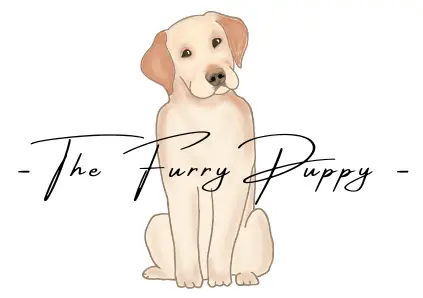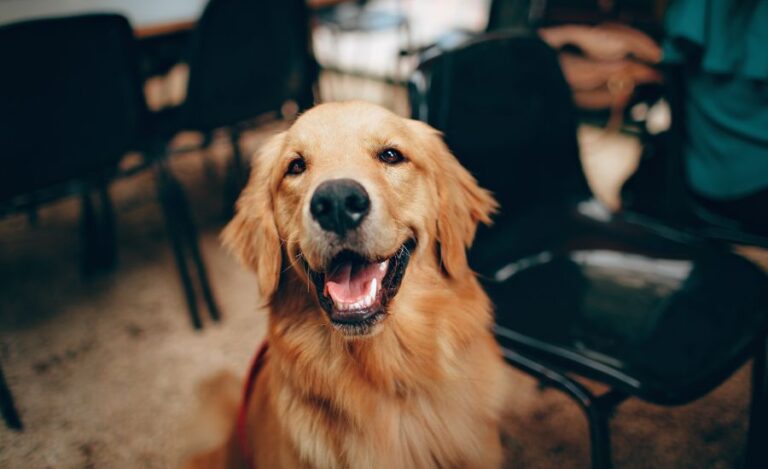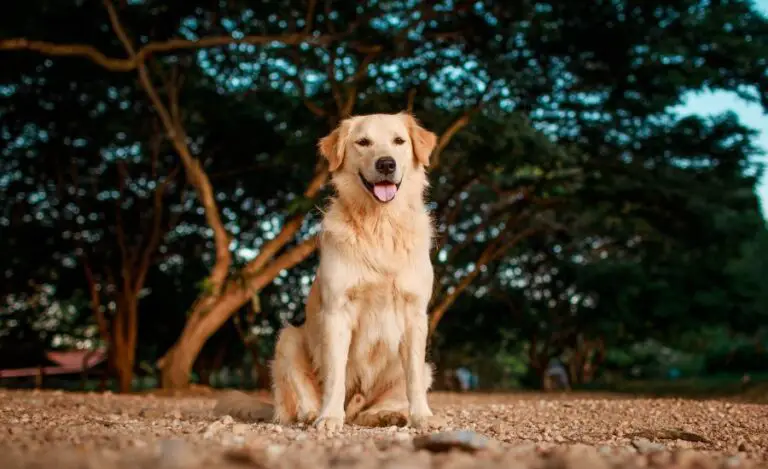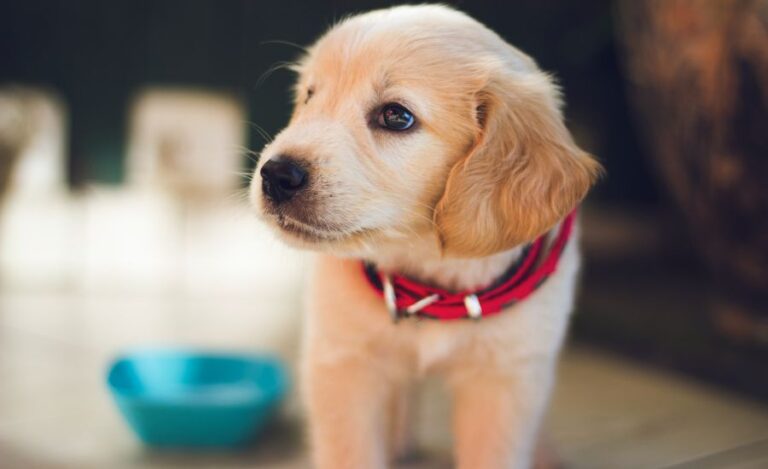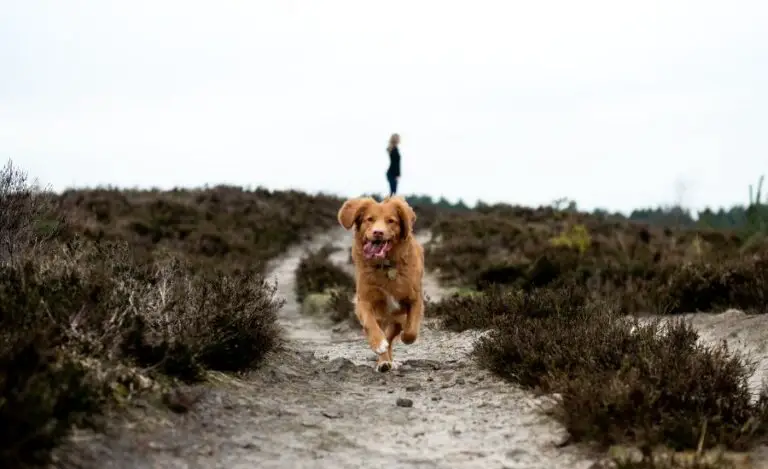Why My Golden Retriever Is Growling – With Examples
Owning a dog, especially a friendly and well-loved breed like the Golden Retriever, can be an immensely rewarding experience.
These loyal and affectionate companions are known for their gentle nature and love for humans. However, there may come a time when you notice your Golden Retriever growling, which can be concerning and confusing.
Understanding why your Golden Retriever is growling is crucial for both their well-being and your relationship with them.
In this article, I will address why your golden retriever is growling and how you can understand the reason behind such behaviour.
What Is Growling?
Growling is a sound that dogs make when they want to tell us or other dogs something important. It’s like their way of saying, “Hey, pay attention! Something’s up!” Sometimes, it might sound a bit fierce, but it doesn’t always mean a dog is being mean or angry.
What Are The Types Of Growling?
1. Playful Growl
Imagine when you’re having a fun time playing with your friends, and you giggle or laugh. Dogs have a playful side too, and they might make a growling sound during playtime. It’s their way of saying, “This is so much fun!” Their body language is usually relaxed, with wagging tails and a happy expression.
2. Warning Growl
Sometimes, dogs growl to give a friendly warning. For example, if you get too close to a dog while they’re enjoying their food or a toy, they might give a low growl. It’s like them saying, “I like this, so please give me space.” They might not be aggressive, but they’re letting you know to be careful.
3. Fearful Growl
When dogs are scared or unsure about something, they might give a fearful growl. This type of growl sounds tense and might be accompanied by a crouched body or raised fur. They’re trying to say, “I’m not sure about this situation, and I need to feel safe.”
4. Defensive Growl
If a dog feels threatened or cornered, they might give a defensive growl. This growl sounds more serious and could mean they’re ready to protect themselves. Their body might be stiff, and they might show their teeth a bit.
5. Aggressive Growl
An aggressive growl is the most serious type of growl. Dogs might use this growl when they’re very unhappy and might act defensively if pushed further. An aggressive growl sounds fierce and is accompanied by a stiff body, raised fur, and sometimes baring teeth.
1. Natural Communication
Growling is a form of communication for dogs, including Golden Retrievers. It’s important to remember that growling is a part of their natural language and doesn’t necessarily indicate aggression.
Dogs communicate through a combination of vocalizations, body language, and behaviour, and growling is one of the ways they express their feelings.
Example
Imagine you have a friend who doesn’t speak the same language as you.
If you wanted to show that you’re not happy, you might make a serious face or use your hands to explain.
For dogs, growling is like their way of making a serious face.
They’re telling us or other dogs how they feel, even though they can’t talk like we do.
2. Fear or Anxiety
One of the most common reasons for growling in Golden Retrievers is fear or anxiety. If your dog is in an unfamiliar or stressful situation, they may growl as a way to communicate their discomfort. This is their way of letting you know that they are feeling threatened or overwhelmed and need space or reassurance.
Example
Think about going to a new school where you don’t know anyone.
You might feel a little scared because everything is different.
Dogs can feel scared too, especially when they’re in places they’ve never been before.
If a dog growls in a new place, it’s like them saying, “I’m not sure about this, and I need some help feeling better.”
3. Resource Guarding
Resource guarding is another potential reason for growling. Dogs can become possessive of items such as food, toys, or even their sleeping spot.
If your Golden Retriever growls when someone approaches them while they have a prized possession, it could be a sign of resource guarding. This behavior is rooted in their instincts and is a way to protect what they consider valuable.
Example
Imagine you have a favourite toy that you really like to play with.
If someone tried to take it away, you might say, “Hey, that’s mine!” Dogs can have favourite things too, like toys or their food bowl.
When they growl, it’s like they say, “This is my stuff, and I want to keep it safe.”
4. Pain or Discomfort
Dogs, like humans, may vocalize when they are in pain or discomfort. If your Golden Retriever suddenly starts growling, especially when touched in a specific area, they could be trying to communicate that they are experiencing physical discomfort. It’s essential to rule out any medical issues by consulting with a veterinarian.
Example
Think about when you have a tummy ache.
You might say, “My tummy hurts!” Dogs can’t talk, but they can show us if they’re hurting by growling.
If a dog has a sore leg and growls when you touch it, it’s like them saying, “Ouch, that hurts!”
5. Territorial Behavior
Golden Retrievers are generally friendly dogs, but they can still exhibit territorial behavior, especially if they feel their territory is being invaded. Growling in response to unfamiliar people or animals approaching their space is a way of asserting their boundaries.
Example
Imagine you have a special spot where you like to sit.
If someone came and sat there without asking, you might feel a bit upset.
Dogs can feel like that about their space too.
If a new dog comes close, and your dog growls, it’s like them telling the other dog, “This is my spot, be careful!”
6. Social Learning
Dogs learn from their environment and interactions with other dogs and humans. If your Golden Retriever has observed other dogs growling or displaying certain behaviours, they may imitate them. This is why early socialization and exposure to positive experiences are crucial in shaping a dog’s behaviour.
Example
Think about how you learn from your friends.
If you see your friend trying a new game and having fun, you might want to try it too.
Dogs are similar.
If a dog sees another dog growling in a certain situation, they might think, “Oh, that’s what we do here,” and start growling too.
What To Do If My Golden Retriever Is Growling?
Understanding why your Golden Retriever is growling is the first step toward addressing the behavior. Here are some tips to help you manage and address the situation:
- Stay Calm: If your dog is growling, it’s important to remain calm. Yelling or punishing your dog can worsen the situation and erode trust between you.
- Observe Triggers: Take note of what triggers the growling. Is it specific situations, people, or objects? Identifying triggers can help you avoid those situations or desensitize your dog to them.
- Consult a Professional: If the growling is becoming a consistent issue and you’re unsure how to handle it, consider seeking guidance from a professional dog trainer or behaviorist. They can provide personalized advice and training techniques to address the behavior.
- Positive Reinforcement: Use positive reinforcement to reward your Golden Retriever for calm behavior. This encourages them to associate positive outcomes with staying calm in various situations.
- Medical Examination: If you suspect pain or discomfort is causing the growling, consult a veterinarian to rule out any underlying medical issues.
Final Words
Growling in Golden Retrievers or any other dogs is a form of communication that can be triggered by various factors, including fear, anxiety, resource guarding, pain, or even learned behavior.
It’s essential to approach the situation with understanding and patience and to address the behaviour in a positive and constructive manner.
By observing your dog’s body language, identifying triggers, and seeking professional guidance when necessary, you can help your Golden Retriever feel more comfortable and secure in their environment, ultimately strengthening the bond between you and your beloved canine companion.
